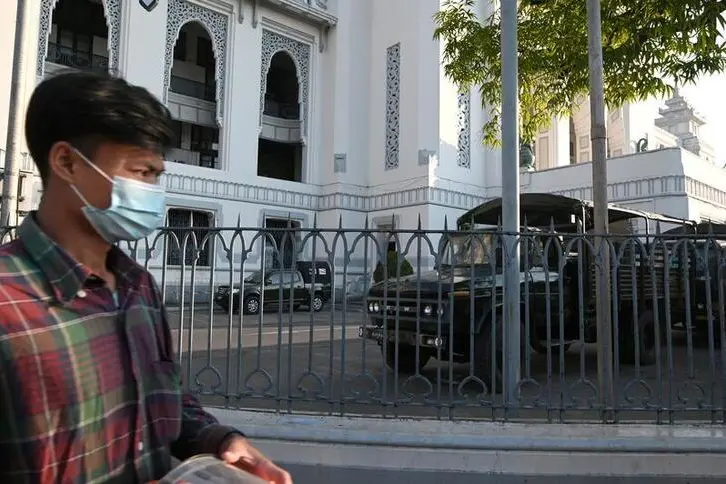PHOTO
Myanmar's shadow government on Friday urged ASEAN not to waver from its policy of excluding the country's military leaders from its gatherings after Thailand hosted junta ministers in informal talks with other Southeast Asian officials.
Government ministers of Thailand, Cambodia, Laos and Vietnam met with junta representatives in Bangkok on Thursday to "find pathways towards a return to normalcy", a Cambodian official said, as violence and political and economic chaos persist in Myanmar after last year's coup.
But key members of the Association of Southeast Asian Nations (ASEAN) - and the most vocal critics of the junta - Indonesia, Malaysia, Singapore and the Philippines declined invitations to the meeting.
Myanmar's National Unity Government (NUG) said it hoped ASEAN would continue to follow its "standing policy on maintaining non-political representation to the summits and the foreign ministers' meeting", according to a statement from spokesperson Kyaw Zaw.
Cambodia's foreign ministry said on Friday the meeting's objective was to discuss accelerating the implementation of a five-point peace process agreed between ASEAN and the junta, which includes an end to hostilities, allowing humanitarian access and engaging all stakeholders.
"This included the opportunity to hear from Myanmar...as well as exploring other approaches that could support the implementation of the Five-Point Consensus," said foreign ministry spokesperson Chum Sounry.
ASEAN has grown increasingly frustrated with a lack of progress on the peace plan from the junta but has ruled out Western-style sanctions against Myanmar or expelling it from the 10-member group. The junta has previously blamed the COVID pandemic and armed resistance groups for failing to achieve peace.
One expert said the informal meeting with junta figures was "not helpful for ASEAN's overall efforts to help bring about a diplomatic solution to resolving the crisis".
"It would seem to breach ASEAN's position of not inviting official Myanmar junta representatives to official or unofficial meetings," said Dylan Loh, assistant professor at Singapore's Nanyang Technological University's public policy division.
The countries that did not attend Thailand's meeting did not provide reasons but a diplomatic source who declined to be identified read to Reuters on Thursday what they said was a letter of objection signed by Singapore's foreign minister to the host. Reuters could not verify the letter's contents.
"Any meeting convened under ASEAN, formal or informal, should not deviate from this decision," it said, according to the source.
(Reporting by Prak Chan Thul in Phnom Penh, Xinghui Kok in Singapore, Reuters staff; Writing by Kanupriya Kapoor; Editing by Kay Johnson and Christian Schmollinger)





















